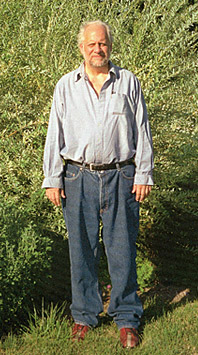Gaia is Good
Recently, renowned theoretical physicist Stephen Hawking announced that we should colonize the moon and Mars as soon as possible. He predicts humankind is destroying the Earth, including itself, and that even if we survived, Mother Earth runs out of milk, figuratively speaking, by 2117. He insists we must exit the planet before then.
Hawking’s grim, “end of times” prediction sounds more rhetorical than theoretical. Because of his fame, the public might take it as literal. As an international seedsman, I take it as wrong.
Allow me to suggest a classic “rosy scenario”—but one that is absolutely achievable. Mother Earth has a maximum carrying capacity of 35.5 billion people—up from today’s population of 7.5 billion—at 1,500 calories per person, per day. At this rate full capacity would be achieved in about 105 years. Our population continues to increase; we ranch, farm and fish everywhere we can; everyone in the world is well-fed.
Specifically, assume that the world’s population doubles every 40 years and that, worldwide, a healthy daily caloric intake averages 1,500. Calculate all animals, fish, plants, grains, wild game, algae and human breast milk. Assume that all of Earth’s arable as well as grazing land will be developed fully by the year 2123. Finally, assume that, facing up to its obesity epidemic, the industrialized world reduces its intake of empty calories and sugar. An optimistic prediction, indeed, but doable.
While you might conclude from my “rose-colored glasses” counter prediction that Hawking’s doomsday scenario continues to be correct, you would have to deny that humans are creative, resourceful and innovative. You’d be wrong. Factor the rate of human technological progress into my scenario, and we could survive on Earth for millions of years.
For example, approximately 10,000 years ago, we invented a highly engineered food—bread. Regarding bread’s main ingredient, Nobelist plant breeder Norman Borlaug saved 245 million lives through breeding a shorter and more productive wheat plant—just one plant and one person fed almost a quarter billion people.
Furthermore, it is universally accepted that malnutrition is caused by poverty, and poverty by social conflict, instability, and war. No freedom—no free markets. Also, food distribution depends on road quality. No paved roads, no distribution. Such mundane realities may not occur to a gifted theoretical physicist. But by sticking to them, mankind keeps civilization flourishing.
Unlike Mr. Hawking, I can speak only about farmers. His dire warnings of catastrophic global warming, air pollution and asteroid collisions elude me. I base my observations not on disaster, but on the power of what the ancient Greeks called Gaia. She is more fecund than all the world’s inhabitants combined.
Add Gaia’s air, water, sunlight and genes to our ability to till the soil, harvest the seas, and tend the herds and flocks. The results are miracles. The trick is to be selective, and to worship—that is, to follow—Gaia, as did Borlaug, and both Gregor Mendel, who discovered genetics, and Charles Darwin, author of the theory of evolution, before him.
I accept Hawking’s vast knowledge of outer space, and hope he explains soon how to colonize the moon and Mars. Who will go? First the starving, with hospital staffs in tow? Then those in Holland, China, Bangladesh and other low-lying places? In what order? But what about the absence of water, oxygen, vapor pressure?
Shall humanity mutate, move to Mars and breathe carbon dioxide? Grow metallic skin to avoid boiling to death? Or wear gasmasks and protective suits? Or maybe we shall live underground? You go first.
Perhaps Hawking will show us how to “terraform”, a science-fiction movie process of creating new atmospheres on other planets. I would like to suggest that it is easier to diet, as it was to curtail tobacco use a generation ago. Better to breed animals and plants and pave more roads.
Hawking is wrong not about Mother Earth, but about ourselves. To paraphrase Alexander Pope, we are Hawking’s proper study. Let us examine what keeps us from creating both optimal horticultural and agricultural production and excellent transportation to all of the world’s markets.
We shorten our lives by killing, maiming and starving each other. Stop that and we shall live on Earth forever.
A version of this article appeared in The Philadelphia Inquirer on July 23, 2017
